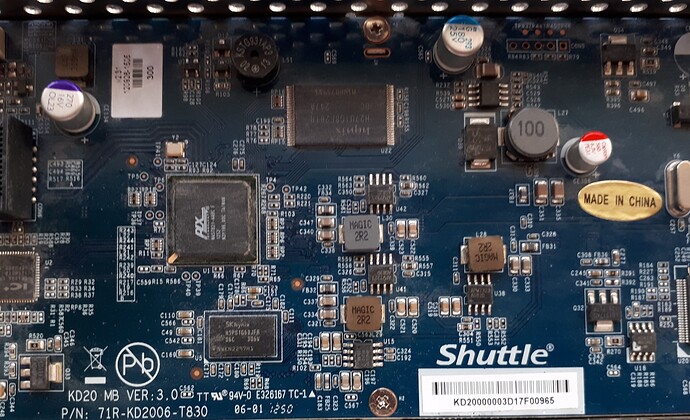Hi everyone!
I'm happy to see there is interest in the oxnas target and the KD20 specifically. I'm running that hardware myself ever since I ported OpenWrt to it years ago and I'm still happy with it.
The initial installation when still running Shuttle's stock firmware is quite tricky by now (given you want to avoid opening the device). This is because the image generated for that purpose grew larger than what the bootloader supports. Hence you need to build that intermediate firmware needed for initial installation yourself.
On a Linux buildhost, do the following
git clone -b lede-17.01 https://git.openwrt.org/openwrt/openwrt.git
cd openwrt
cat >.config <<EOF
CONFIG_TARGET_oxnas=y
CONFIG_TARGET_oxnas_DEVICE_kd20=y
CONFIG_TARGET_BOARD="oxnas"
CONFIG_CLEAN_IPKG=y
# CONFIG_KERNEL_DEBUG_INFO is not set
# CONFIG_KERNEL_DEBUG_KERNEL is not set
# CONFIG_KERNEL_KALLSYMS is not set
# CONFIG_PACKAGE_block-mount is not set
# CONFIG_PACKAGE_fdisk is not set
# CONFIG_PACKAGE_kmod-ata-core is not set
# CONFIG_PACKAGE_kmod-crypto-crc32c is not set
# CONFIG_PACKAGE_kmod-crypto-hash is not set
# CONFIG_PACKAGE_kmod-fs-exportfs is not set
# CONFIG_PACKAGE_kmod-fs-ext4 is not set
# CONFIG_PACKAGE_kmod-fs-xfs is not set
# CONFIG_PACKAGE_kmod-lib-crc16 is not set
# CONFIG_PACKAGE_kmod-lib-crc32c is not set
# CONFIG_PACKAGE_kmod-md-mod is not set
# CONFIG_PACKAGE_kmod-nls-base is not set
# CONFIG_PACKAGE_kmod-scsi-core is not set
# CONFIG_PACKAGE_kmod-usb-core is not set
# CONFIG_PACKAGE_kmod-usb-ledtrig-usbport is not set
# CONFIG_PACKAGE_kmod-usb-storage is not set
# CONFIG_PACKAGE_kmod-usb2 is not set
# CONFIG_PACKAGE_kmod-usb2-oxnas is not set
# CONFIG_PACKAGE_kmod-usb3 is not set
# CONFIG_PACKAGE_libblkid is not set
# CONFIG_PACKAGE_libfdisk is not set
# CONFIG_PACKAGE_libmount is not set
# CONFIG_PACKAGE_libpthread is not set
# CONFIG_PACKAGE_librt is not set
# CONFIG_PACKAGE_libsmartcols is not set
# CONFIG_PACKAGE_libuclient is not set
# CONFIG_PACKAGE_libuuid is not set
# CONFIG_PACKAGE_lsblk is not set
# CONFIG_PACKAGE_mdadm is not set
# CONFIG_PACKAGE_opkg is not set
# CONFIG_PACKAGE_uclient-fetch is not set
EOF
make oldconfig </dev/null
make -j$(nproc)
That will give you a file bin/targets/oxnas/generic/lede-oxnas-kd20-factory.tar.gz which can be uploaded to the system update web interface of vendor's original firmware.
Once you have successfully flashed the intermediate firmware, you can now access it using ssh (assuming KD20 is directly connected to eth0 on your host):
# download up to date firmware to flash, to be safe get both sysupgrade and ubinized
wget https://downloads.openwrt.org/releases/19.07.5/targets/oxnas/ox820/openwrt-19.07.5-oxnas-ox820-shuttle_kd20-squashfs-sysupgrade.tar
wget https://downloads.openwrt.org/releases/19.07.5/targets/oxnas/ox820/openwrt-19.07.5-oxnas-ox820-shuttle_kd20-squashfs-ubinized.bin
ping ff02::1%eth0
# look for the duplicate response, that's the KD20 link-local IPv6 address and
# replace fe80::1234:56ff:fe78:90ab%eth0 below with the actual address you saw
# in the response
scp openwrt-19.07.5-oxnas-ox820-shuttle_kd20* root@[fe80::1234:56ff:fe78:90ab%eth0]:/tmp
ssh root@fe80::1234:56ff:fe78:90ab%eth0
# you are now connected to LEDE initramdisk system on the KD20
# fingers crossed, this should flash the kernel directly to NAND and write
# squashfs-rootfs to the rootfs UBI volume.
cat /proc/mtd
# I believe 'ubi' should be mtd4, but better check
# make sure it is detached
ubidetach /dev/mtd4
# re-format UBI and write rootfs
ubiformat /dev/mtd4 -f /tmp/openwrt-19.07.5-oxnas-ox820-shuttle_kd20-squashfs-ubinized.bin
# write kernel (and maybe rootfs again, but nvm)
sysupgrade -n /tmp/openwrt-19.07.5-oxnas-ox820-shuttle_kd20-squashfs-sysupgrade.tar
I've been using my own device in production ever since I ported OpenWrt to it years ago, and I guess for years I've been the only user. However, recently more people have been reaching out to me because there aren't many other choices left for that hardware...
It'd be nice if we can work together to document and improve the initial installation process and allow people to install without serial adapter or having to open the device (I've tried that method exactly once on a new device running stock firmware ~ 4 years ago).



 So what now ? What are my options?
So what now ? What are my options?
